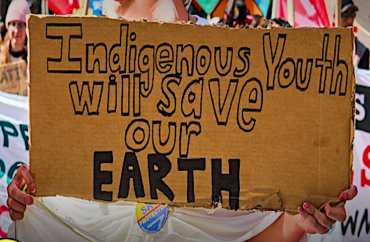
‘Connect youth with Indigenous elders’ knowledge’
The University of Oklahoma has received a $4 million grant to “establish respectful and reciprocal partnerships” with Native American tribal communities regarding the issue of “climate resilience.”
The grant, which includes the Chickasaw Nation and the University of New Mexico, comes from a National Science Foundation program that “aims to advance geographic diversity in STEM fields,” according to OU News.
Research “interests” of the project — “Enhancing Indigenous Community Resilience to Climate Change Impacts through Partnerships and Co-Development of Adaptation Planning” — will be determined by “community needs and interests.”
OU meteorology professor Elinor Martin said “We are working to establish respectful, reciprocal and sustainable research and education partnerships […] Tribal communities have been adapting [for climate change] and have been at the forefront of this for a long, long time, but they have generally not been included in the research and planning process.”
One facet of the project will allow Native communities to “evaluate how changes in water quantity will affect their plans for food sovereignty and cultural practices.”
Chickasaw Nation Land Sustainability and Services Director Jennie Mosely said another goal is to “connect youth with Indigenous elders’ knowledge.” She noted when the Chickasaw were forced to the Oklahoma Territory (almost two hundred years ago), they had to “endure hot summers and deadly winters.”
MORE: New study miffed at lack of climate change themes in modern movies
Local teacher Amelia Cook, an OU PhD candidate who researches “indigenous science knowledge and Native American storytelling for tools to teach climate science and build community resilience,” said the project curriculum “weaves together multiple perspectives, emphasizing the importance of understanding climate resilience from both a scientific and cultural standpoint.”
A recent report by the Oklahoma Council of Public Affairs points to a 2023 U. Oklahoma study which claimed Native Americans in the state “face a 64-to-68-percent higher risk” of climate-related rainfall events than non-Natives.
But a study from earlier this year “predicted” most of that “increased risk” comes from the growth of the Native population, expected to more than double by 2100. In other words, “population increases ‘outweigh climate changes’ for heavy rainfall and flash floods ‘meaning that population growth contributes more to increased exposure than climate change.’”
MORE: UCLA study: Gay couples at greater risk from climate change
IMAGE: Indigenous Climate Action/X
Like The College Fix on Facebook / Follow us on Twitter





Please join the conversation about our stories on Facebook, Twitter, Instagram, Reddit, MeWe, Rumble, Gab, Minds and Gettr.